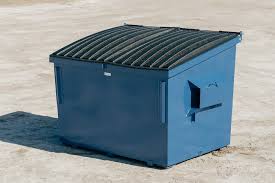Industrial Bin Services by Zero Waste Services provide efficient waste management solutions for businesses. They ensure proper disposal and recycling of industrial waste.
Industrial Bin Services cater to various industries by offering tailored waste management solutions. They handle everything from collection and transportation to disposal and recycling. These services help businesses maintain cleanliness and comply with environmental regulations. Using specialized bins and equipment, they manage waste effectively and reduce environmental impact.
Businesses benefit from reduced clutter, safer work environments, and better waste management practices. Industrial Bin Services also offer customizable schedules to meet specific business needs. Their professional approach ensures timely, hassle-free service. Partnering with them can improve operational efficiency and promote sustainability in your business.
Introduction To Industrial Bin Services
Industrial bin services are crucial for managing large amounts of waste. These services ensure that waste is collected, sorted, and disposed of properly. They cater to various industries, including manufacturing, construction, and retail. These services help keep the environment clean and safe.
Importance In Waste Management
Industrial bin services play a vital role in waste management. They help manage the waste produced by industries. Proper waste management reduces pollution and promotes recycling. These services also help in complying with environmental regulations. By using industrial bin services, companies contribute to a cleaner planet.
Key Benefits
| Benefit | Description |
|---|---|
| Efficiency | Industrial bin services make waste collection and disposal efficient. |
| Cost-Effective | These services help save money on waste management. |
| Compliance | They ensure compliance with local waste regulations. |
| Environmental Protection | They help reduce pollution and promote recycling. |
- Efficiency: Quick and effective waste management.
- Cost-Effective: Saves money on waste disposal.
- Compliance: Meets legal waste disposal requirements.
- Environmental Protection: Reduces pollution and encourages recycling.
Types Of Industrial Bins
Industrial bin services are essential for managing large-scale waste efficiently. Different types of industrial bins suit various needs. Understanding these types can help businesses choose the right bin for their waste management requirements. Below are the main types of industrial bins commonly used.
Roll-off Bins
Roll-off bins are large, rectangular containers. They are ideal for construction and demolition waste. These bins are easy to load due to their open tops. They can handle bulky and heavy materials. Roll-off bins are available in various sizes, usually ranging from 10 to 40 cubic yards. They are delivered by trucks equipped with a roll-off mechanism.
- Sizes: 10, 20, 30, 40 cubic yards
- Materials: Construction debris, bulky items, heavy waste
- Features: Open top, easy loading, high capacity

Front Load Bins
Front load bins are smaller than roll-off bins. They are perfect for regular, everyday waste. These bins are commonly used by businesses like restaurants and retail stores. Front load bins have lids to keep waste contained. They are serviced by front-loading trucks. These bins come in different sizes, typically ranging from 2 to 8 cubic yards.
| Feature | Details |
|---|---|
| Sizes | 2, 4, 6, 8 cubic yards |
| Materials | General waste, light industrial waste |
| Features | Closed lids, regular collection, smaller size |
Choosing the right type of bin can optimize waste management. It ensures efficient collection and disposal of various waste types.

Choosing The Right Bin Size
Choosing the right bin size is crucial for efficient waste management. A properly sized bin saves space and reduces costs. It also ensures compliance with regulations. Let's explore how to make an informed decision.
Assessing Waste Volume
Assessing waste volume helps in selecting the correct bin size. Start by estimating your daily waste production. Consider the types of waste generated. Are you disposing of general waste, recyclables, or hazardous materials? A good practice is to measure waste volume over a week. This provides a clear picture of your average waste output.
| Waste Type | Daily Volume | Weekly Volume |
|---|---|---|
| General Waste | 50 liters | 350 liters |
| Recyclables | 30 liters | 210 liters |
| Hazardous Waste | 10 liters | 70 liters |
Based on these numbers, you can choose a bin that fits your needs. For instance, a 400-liter bin can handle general waste for a week.
Space Considerations
Space considerations are vital when selecting a bin size. Ensure the bin fits in your available space. Measure the area where the bin will be placed. Check for any height, width, or depth restrictions. Consider access for bin collection services.
- Measure the available space.
- Check for access restrictions.
- Consider ease of use and movement.
Having the right bin size makes waste management smoother and more efficient.

Cost-effective Solutions
Choosing the right industrial bin services can save you money. Effective waste management can reduce costs and increase efficiency. Discover how you can benefit from cost-effective solutions in waste handling.
Budget-friendly Options
Many companies offer budget-friendly options for industrial bin services. These plans are designed to meet your needs without breaking the bank. Here are some examples:
- Flexible bin sizes to match your waste volume
- Scheduled pickups to avoid overflow charges
- Recycling programs that lower disposal costs
These options ensure you only pay for what you need. This helps to keep your waste management costs low.
Long-term Savings
Investing in effective waste management leads to long-term savings. Here’s how:
| Strategy | Benefit |
|---|---|
| Recycling Programs | Reduces landfill fees |
| Efficient Bin Usage | Minimizes unnecessary pickups |
| Employee Training | Improves waste sorting |
These strategies help reduce overall waste management expenses. Over time, these savings can be significant.
Environmental Impact
Industrial bin services have a significant environmental impact. They play a crucial role in managing waste and promoting sustainability. Proper waste management reduces landfill waste, conserves resources, and minimizes pollution.
Recycling Initiatives
Many industrial bin services support recycling initiatives. They provide bins for different types of recyclables like paper, plastics, and metals. These services ensure that recyclable materials are properly sorted and sent to recycling facilities. This reduces the amount of waste that ends up in landfills.
Here is a table showing common recyclable materials and their benefits:
| Material | Benefit |
|---|---|
| Paper | Saves trees and reduces landfill waste |
| Plastics | Reduces the need for new plastic production |
| Metals | Conserves natural resources and energy |
Sustainable Practices
Industrial bin services also incorporate sustainable practices. These practices include using bins made from recycled materials and implementing efficient collection routes. This reduces fuel consumption and lowers carbon emissions. They also educate businesses on best waste management practices.
Some sustainable practices include:
- Using eco-friendly cleaning products for bins
- Implementing energy-efficient waste processing
- Promoting the use of reusable containers
By adopting these practices, industrial bin services contribute to a cleaner and greener environment.
Safety And Compliance
Safety and Compliance are crucial aspects of Industrial Bin Services. Adhering to these standards ensures the well-being of workers and the environment. This section will cover the necessary regulatory standards and best practices for maintaining safety and compliance.
Regulatory Standards
Industrial bin services must follow strict regulatory standards. These regulations are set by government agencies to ensure safety. Below are some key regulatory standards:
- OSHA (Occupational Safety and Health Administration)
- EPA (Environmental Protection Agency)
- Local health and safety laws
OSHA regulations focus on worker safety. They include guidelines for handling hazardous materials and equipment. EPA standards are about environmental protection. They ensure proper waste disposal and recycling methods. Local laws often have specific rules for industrial bins in certain areas.
Best Practices
Following best practices in industrial bin services is essential. It ensures safety and compliance with regulations. Here are some best practices to follow:
- Regular inspection of bins and equipment
- Proper labeling of hazardous materials
- Training workers on safety protocols
Regular inspections help identify any issues early. Proper labeling prevents accidents and mishandling of materials. Training ensures that all workers know the safety protocols.
| Best Practice | Importance |
|---|---|
| Regular Inspections | Identify issues early |
| Proper Labeling | Prevent mishandling |
| Worker Training | Ensure safety knowledge |
Adhering to these best practices and regulatory standards ensures a safe working environment. It also helps in maintaining compliance with all necessary laws and regulations.
Technology Integration
In today's industrial bin services, technology plays a key role. Integrating smart technology enhances efficiency and management. Let's explore how technology integration is transforming this sector.
Smart Bins
Smart bins are revolutionizing waste management. These bins are equipped with sensors and IoT technology. They help in monitoring waste levels in real-time.
When a bin is full, it sends a notification. This reduces the need for manual checks. Smart bins also help in optimizing collection routes. This saves both time and fuel.
Using smart bins can significantly reduce operational costs. It ensures a cleaner and more efficient waste management system.
Tracking Systems
Tracking systems are another key technology integration. These systems use GPS and RFID technologies. They help in tracking bin locations and movements.
With tracking systems, managers can monitor bin usage patterns. This data helps in planning better waste management strategies. It also ensures that bins are not misplaced or stolen.
Tracking systems provide real-time data and analytics. This enhances decision-making and operational efficiency.

Credit: www.linkedin.com
Choosing A Service Provider
Choosing a service provider for industrial bin services can be challenging. The right provider ensures efficient waste management, cost savings, and regulatory compliance. Below are key considerations and questions to ask when selecting a provider.
Factors To Consider
- Reputation: Look for providers with positive reviews and strong reputations.
- Experience: Ensure the provider has experience in industrial waste management.
- Services Offered: Confirm they offer the specific services you need.
- Compliance: Verify they comply with local and national regulations.
- Cost: Compare pricing but focus on value, not just the lowest price.
- Customer Support: Check if they provide excellent customer service and support.
Questions To Ask
- What types of waste do you handle? Ensure they can manage your specific waste types.
- How do you ensure compliance? Ask about their procedures for regulatory compliance.
- Can you provide references? Request testimonials or case studies from other clients.
- What are your pricing structures? Understand their pricing models and any additional fees.
- What is your response time for service requests? Ensure they can respond promptly to your needs.
- Do you offer customized solutions? Check if they can tailor services to your specific requirements.
Case Studies
Industrial Bin Services have transformed waste management for many companies. Here, we showcase case studies detailing their success stories and lessons learned.
Success Stories
Several businesses have benefited from Industrial Bin Services. Their efficient waste management solutions have saved time and money.
| Company | Outcome |
|---|---|
| ABC Manufacturing | Reduced waste costs by 30% |
| XYZ Retail | Improved recycling rates by 50% |
ABC Manufacturing faced high waste disposal costs. Industrial Bin Services implemented a comprehensive waste management plan. This led to a 30% reduction in costs.
XYZ Retail struggled with low recycling rates. With Industrial Bin Services' help, they achieved a 50% improvement.
Lessons Learned
Every project provides valuable lessons. Here are some key takeaways from our case studies.
- Customized Solutions: Tailored plans work best for different industries.
- Employee Training: Educating staff enhances waste management practices.
- Regular Audits: Routine checks ensure ongoing efficiency.
Customized solutions address unique needs of each business. Employee training is crucial for effective waste management. Regular audits help maintain optimal performance.
Future Trends
The industrial bin services industry is evolving rapidly. With technological advancements, companies are adopting new methods for waste management. These future trends focus on efficiency, sustainability, and innovation.
Innovative Solutions
Technological innovations are transforming industrial bin services. Smart bins are becoming popular. These bins come with sensors that detect fill levels. They notify the service provider when they need emptying. This reduces unnecessary trips and saves fuel.
Another innovation is the use of automated sorting systems. These systems sort waste efficiently. They separate recyclables from non-recyclables, improving recycling rates. This technology also reduces manual labor.
Electric and hybrid waste collection vehicles are gaining traction. They reduce carbon emissions and are more environmentally friendly. These vehicles also offer better fuel efficiency, cutting down operational costs.
Industry Predictions
The future of industrial bin services looks promising. Here are some key predictions:
- Increased adoption of smart bins and IoT technology.
- Growth in the use of automated sorting systems.
- More electric and hybrid waste collection vehicles.
- Greater focus on sustainability and green practices.
- Enhanced data analytics for optimizing waste collection routes.
Smart bins will become standard in the industry. They will help optimize waste collection schedules. This will lead to lower operational costs and better resource management.
Automated sorting systems will continue to evolve. They will become more efficient and accurate. This will significantly improve recycling rates and reduce waste.
Electric and hybrid vehicles will dominate the market. They will replace traditional diesel-powered trucks. This shift will help reduce the carbon footprint of waste collection services.
Companies will focus more on sustainability. They will adopt green practices and aim for zero waste targets. This will benefit the environment and improve their public image.
Data analytics will play a crucial role. Companies will use data to optimize routes and schedules. This will enhance efficiency and reduce costs.

Credit: www.sbvacuumservices.com
Frequently Asked Questions
What Are Industrial Bin Services?
Industrial bin services provide businesses with large-scale waste management solutions. They handle bulk waste efficiently and safely.
Why Are Industrial Bins Important?
Industrial bins are crucial for managing large volumes of waste. They keep workplaces clean and compliant with regulations.
How Do Industrial Bin Services Work?
Industrial bin services deliver, empty, and maintain large waste bins. They ensure timely waste collection and disposal.
What Types Of Waste Can Industrial Bins Handle?
Industrial bins can handle various waste types, including general waste, recyclables, and hazardous materials. They are versatile and durable.
Conclusion
Industrial bin services are essential for maintaining cleanliness and efficiency in various sectors. They ensure proper waste management and recycling. By choosing reliable industrial bin services, businesses can enhance productivity and sustainability. Always prioritize companies with a strong track record and commitment to environmental responsibility.
Make the right choice and invest in quality industrial bin services.